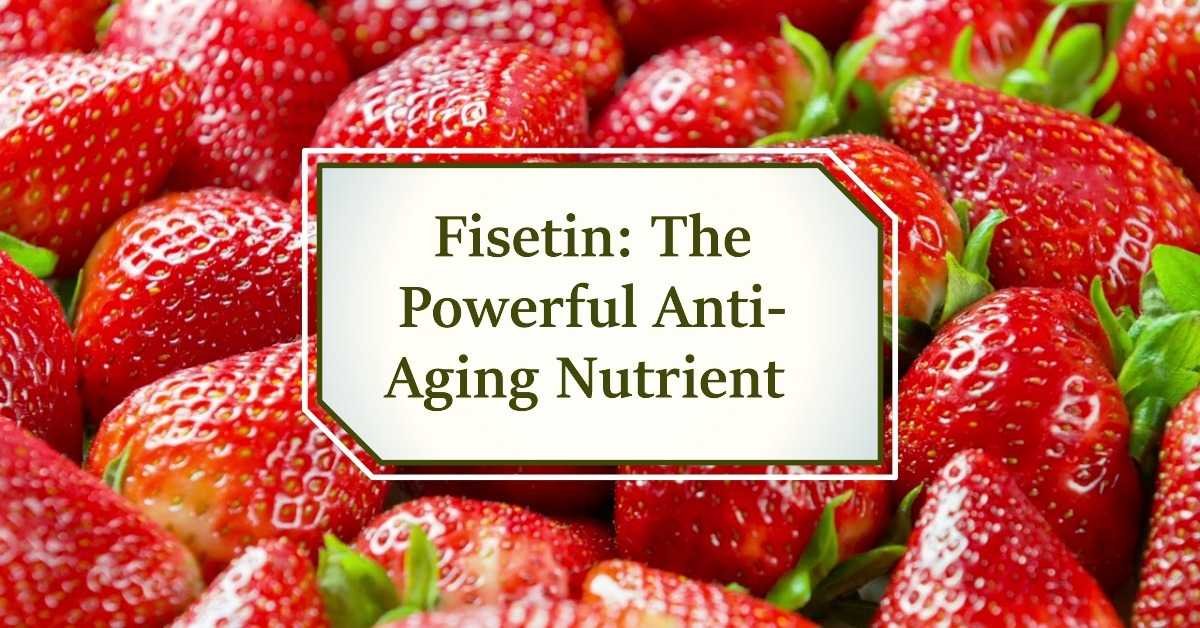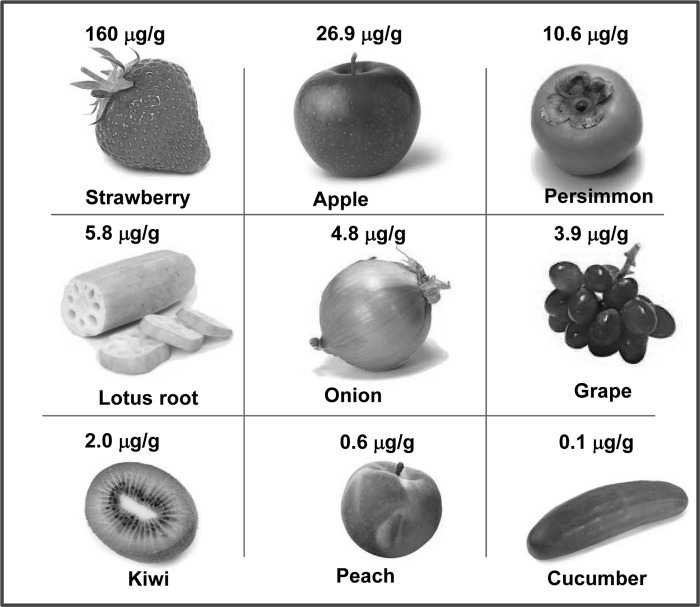What is Fisetin? Fisetin Benefits, Bioavailability, Food Sources

In recent years, there has been growing interest in the potential health benefits of natural compounds found in plants.
One such compound is fisetin, a flavonoid and polyphenol that has been shown to have anti-inflammatory, chemotherapeutic, senolytic, and anti-aging properties.
In this article I will explore the origins of fisetin, the potential fisetin benefits it offers for human health, its potential side effects, and the best ways to consume fisetin to maximize its benefits.
Trans-Reseratrol Powder, 5 Ounces
- Pure Trans Resveratrol Powder with Immune Natural Vitamin E (D-Alpha Tocopherol) from Micro Ingredients.
- 5 Ounce, (Resveratrol 500mg Per Serving), 2 in 1 Formula for Super Antioxidant, Micronized Powder for Better Absorption, Vegan Friendly.*
- Non-GMO, No Gluten, No Soy, No Tree Nuts, No Artificial Colors, No Flavors and No Irradiation.
⭐⭐⭐⭐⭐ | 4.6 (535 reviews)
What is Fisetin?
Fisetin is a natural plant flavonoid and polyphenol that belongs to the flavonol subgroup of flavonoids. It is found in various fruits and vegetables, including strawberries, apples, persimmons, onions, grapes, and cucumbers.
The highest concentrations of fisetin are found in strawberries and onions, with strawberries containing up to 160μg/g of fisetin and onions containing up to 500μg/g.
Fisetin was first identified in 1891 by the French chemist M. Rigaud, who isolated the compound from the wood of Rhus cotinus. However, its potential health benefits have only been studied in recent years.
Fisetin Benefits
- Fights Inflammation
Inflammation is a natural immune response to infection or injury, but chronic inflammation can contribute to the development of various diseases, including cancer, heart disease, and diabetes.
It is a well-known fact that flavonoids are highly anti-inflammatory, making them potential therapeutic alternatives for chronic conditions such as cancer, diabetes, cardiovascular and neurodegenerative disorders. [1]

Fisetin has been shown to have anti-inflammatory properties, which can help reduce chronic inflammation and improve overall health.
More specifically, in a research study, scientists explored the effects of fisetin on inflammation and autophagy in cells treated with LPS.
They used microarray analysis to identify genes that were regulated by fisetin and found that it decreased the expression and secretion of several inflammatory cytokines.
Fisetin also facilitated autophagosome-lysosome fusion and degradation, which is important for clearing damaged cells and preventing inflammation.
The researchers discovered that fisetin also inhibits the PI3K/AKT/mTOR signaling pathway, which is involved in inflammation and autophagy.
- Has Anticancer Properties
Fisetin has been found to have anti-cancer properties and has been shown to inhibit the growth and spread of various types of cancer cells, including breast, lung, colon, and prostate cancer cells.
There are many research studies that support this statement. More specifically:
A review published in the Food Science and Nutrition journal, highlights fisetin’s potential as an anticancer agent in cell cultures, animal, and human studies.
It says that Fisetin has been shown to inhibit various stages of cancer cells, such as proliferation and invasion, prevent cell growth, induce apoptosis, and modulate the expressions of Bcl-2 family proteins.
It also suppresses signaling pathways and reduces the activation of NF-κB, an oncoprotein.
Overall, fisetin has promising anticancer activity and can inhibit cancer cell stages, prevent progression in cell cycle and cell growth, and induce apoptosis.
In another study, researchers explored the use of fisetin, in combination with radiotherapy for treating triple-negative breast cancer (TNBC).
TNBC is known for its aggressive nature and limited response to radiotherapy due to DNA damage response (DDR) signaling-mediated radioresistance.
Y-box binding protein-1 (YB-1) is a protein that contributes to cancer hallmarks, including resistance to radiotherapy-induced cell death.
Fisetin partially inhibits YB-1 phosphorylation mediated by p90 ribosomal S6 kinase (RSK), which makes it an attractive candidate for use in combination with radiotherapy to enhance its effectiveness against TNBC.
- Has Senolytic properties
Senolytics are compounds that can selectively eliminate senescent cells, which are cells that have stopped dividing and accumulate in the body as we age.
These cells can contribute to the development of age-related diseases, and fisetin has been shown to have senolytic properties, which can help remove these cells from the body.
In a scientific article published in EBioMedicine, the authors explain their study on senescence, a tumor suppressor mechanism activated in stressed cells to prevent replication of damaged DNA.
They aimed to identify flavonoids with potent senolytic activity and found that fisetin was the most potent senolytic.
The authors tested fisetin in mice modeling a progeroid syndrome and aged wild-type mice and found that administration of fisetin restored tissue homeostasis, reduced age-related pathology, and extended median and maximum lifespan.
The study showed that fisetin has cell-type specificity and could potentially improve numerous age-related conditions.
- Extends Lifespan
Studies have found that fisetin can extend the lifespan of various organisms, including fruit flies, mice, and nematodes.
It is believed that fisetin works by activating a specific protein called SIRT1, which has been shown to regulate lifespan and delay age-related diseases. [2] [3]
Of course, all the other factors like its high antioxidant content, its inflammation fighting properties and its senolytics properties, all contribute to Lifespan extension.
- Improves Cognition and Memory
Fisetin has been shown to have cognitive and memory-enhancing effects. It has been found to improve learning and memory in rats and protect against cognitive decline in mice.

More specifically, Fisetin, can increase intracellular levels of the major intracellular antioxidant glutathione, activate key neurotrophic factor signaling pathways, and has anti-inflammatory activity against microglial cells. These properties suggest that fisetin has the potential to reduce the impact of age-related neurological diseases on brain function. [4]
Another study investigated the memory-enhancing effect of fisetin. The researchers tested four flavonoids and found that only fisetin facilitated the induction of long-term potentiation (LTP) in the hippocampal region of the brain, which is important for memory.
- Inhibits the mTOR Pathway
The mTOR pathway is a cellular signaling pathway that regulates various cellular processes, including cell growth and metabolism.
Dysregulation of the mTOR pathway has been linked to the development of various age-related diseases.
Fisetin has been shown to inhibit the mTOR pathway, which can help reduce the risk of these diseases. [5]
- Improves Skin Health
Fisetin has been shown to improve skin health by reducing the production of metalloproteinases, which are enzymes that break down collagen and elastin and play an important role in tissue remodeling in both normal and pathological conditions, such as cancer metastasis.
Researchers screened extracts of medicinal herbs for MMP inhibitors and found that fisetin was a strong inhibitor of several MMPs, including MMP-14. [6]

Potential Side Effects
While fisetin is generally considered safe, there are some potential side effects to be aware of. These include gastrointestinal upset, headaches, and allergic reactions.
It is also important to note that fisetin may interact with certain medications, such as blood thinners and chemotherapy drugs, so it is important to consult with your doctor before taking fisetin supplements.
Dosage
The optimal dosage of fisetin is not yet clear, as there have not been enough human studies to determine a safe and effective dosage.
However, animal studies have shown that fisetin can be safely consumed at doses of up to 500mg/kg of body weight.
Top 10 Foods that contain Fisetin
Here are the top 10 foods that contain fisetin:
| Food | Fisetin Content per 100 grams |
|---|---|
| Strawberries | 0.15 – 1.5 mg |
| Onions | 0.9 – 4.3 mg |
| Apples | 0.01 – 1.2 mg |
| Persimmons | 1.35 mg |
| Grapes | 0.13 – 0.57 mg |
| Cucumbers | 0.03 mg |
| Mangoes | 0.05 mg |
| Kiwis | 0.02 mg |
| Tomatoes | 0.17 mg |
| Peaches | 0.01 – 1.7 mg |

How to take fisetin to make it more bioavailable?
Fisetin is not very bioavailable, meaning that the body has a difficult time absorbing and utilizing it. However, there are ways to increase the bioavailability of fisetin, such as:
- Combining fisetin with other polyphenols, such as quercetin or resveratrol.
- Taking fisetin with a meal that contains fat, as polyphenols are fat-soluble.
- Using a supplement that contains a bioenhancer, such as piperine or curcumin.
Best Fisetin Supplements
Here are three of the best fisetin supplements on the market:
Life Extension Fisetin Capsules – This supplement contains 100mg of fisetin per capsule and is combined with quercetin to enhance bioavailability.
HUMANX Fisetin 500mg – This supplement contains 500mg of fisetin per dose and it is third party tested for its purity.
Bottom Line
Fisetin is a natural plant flavonoid and polyphenol that has numerous potential health benefits, including anti-inflammatory, chemotherapeutic, senolytic, and anti-aging properties.
While more human studies are needed to determine the optimal dosage and potential side effects, fisetin is generally considered safe and can be found in various foods or consumed through supplements.
Read Next
- 8 Best Anti-Aging Habits To Slow Down the Aging Process and Look and Feel Your Best
- 9 CoQ10 Health Benefits, Foods, Dosage, Deficiency, Supplements
- Crocin (Saffron): Health Benefits, Anti-Aging (Fact Checked)
- Perpetua Life AEON Review Based on Extensive Research and Scientific References
- L-Theanine Anti Aging Properties: A Natural Solution to Promote Longevity




